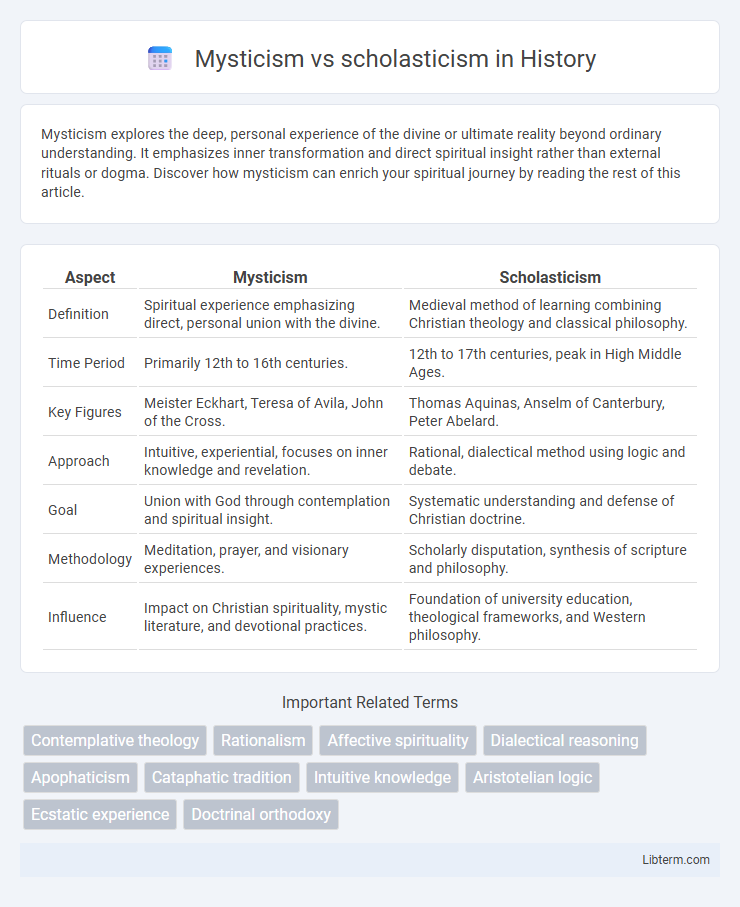Mysticism explores the deep, personal experience of the divine or ultimate reality beyond ordinary understanding. It emphasizes inner transformation and direct spiritual insight rather than external rituals or dogma. Discover how mysticism can enrich your spiritual journey by reading the rest of this article.
Table of Comparison
| Aspect | Mysticism | Scholasticism |
|---|---|---|
| Definition | Spiritual experience emphasizing direct, personal union with the divine. | Medieval method of learning combining Christian theology and classical philosophy. |
| Time Period | Primarily 12th to 16th centuries. | 12th to 17th centuries, peak in High Middle Ages. |
| Key Figures | Meister Eckhart, Teresa of Avila, John of the Cross. | Thomas Aquinas, Anselm of Canterbury, Peter Abelard. |
| Approach | Intuitive, experiential, focuses on inner knowledge and revelation. | Rational, dialectical method using logic and debate. |
| Goal | Union with God through contemplation and spiritual insight. | Systematic understanding and defense of Christian doctrine. |
| Methodology | Meditation, prayer, and visionary experiences. | Scholarly disputation, synthesis of scripture and philosophy. |
| Influence | Impact on Christian spirituality, mystic literature, and devotional practices. | Foundation of university education, theological frameworks, and Western philosophy. |
Introduction to Mysticism and Scholasticism
Mysticism emphasizes direct, personal experience of the divine, often through contemplation and spiritual insight, contrasting with scholasticism's reliance on rational argumentation and systematic theology rooted in Aristotelian philosophy. Medieval mystics like Meister Eckhart and Julian of Norwich sought to transcend intellectual understanding to achieve union with God, whereas scholastic thinkers such as Thomas Aquinas structured religious knowledge through logical analysis and disputation. This fundamental difference shaped distinct approaches to medieval Christian thought, highlighting experiential versus intellectual pathways to spiritual truth.
Historical Origins and Development
Mysticism originated in early Christian, Jewish, and Islamic traditions as a direct, experiential pursuit of divine union, emphasizing personal spiritual insight beyond formal doctrine. Scholasticism emerged in medieval Europe around the 12th century as a systematic method of learning, combining Aristotelian philosophy with Christian theology to reconcile faith and reason in scholastic universities. The historical development of mysticism and scholasticism reflects divergent approaches to knowledge: mysticism prioritizes inner spiritual experience, while scholasticism focuses on intellectual rigor and theological debate.
Core Philosophical Differences
Mysticism emphasizes direct, experiential knowledge of the divine through intuition and inner spiritual experiences, contrasting sharply with scholasticism's rigorous reliance on reason, logic, and systematic theology to understand religious truths. Scholasticism seeks clarity and coherence by integrating classical philosophy, primarily Aristotelian logic, with Christian doctrine, whereas mysticism often transcends rational explanations, valuing personal, transcendent union with the divine. These core philosophical differences highlight mysticism's focus on subjective, immediate insight and scholasticism's commitment to objective, analytical inquiry.
Key Figures in Mysticism
Key figures in mysticism, such as Meister Eckhart, Julian of Norwich, and Teresa of Avila, emphasized direct, personal experiences of the divine that transcended rational understanding. Their works contrast sharply with scholastic thinkers like Thomas Aquinas, who sought to reconcile faith with reason through systematic theology and philosophical argumentation. Mystics often used symbolic language and contemplative practices to explore spiritual truths beyond the empirical methods favored in scholasticism.
Prominent Scholastic Thinkers
Prominent scholastic thinkers such as Thomas Aquinas, Albertus Magnus, and Duns Scotus emphasized rigorous dialectical reasoning and systematic theology to reconcile faith with reason during the Middle Ages. Their work laid the intellectual foundation of scholasticism, focusing on scholastic methods to analyze and interpret Christian doctrine through Aristotelian philosophy. Unlike mysticism, which prioritizes direct, personal spiritual experience, scholasticism champions logical argumentation and scholarly debate in theological inquiry.
Methods of Acquiring Knowledge
Mysticism emphasizes intuitive, experiential knowledge gained through direct personal encounter with the divine or ultimate reality, often involving meditation, contemplation, and spiritual insight. Scholasticism relies on rigorous dialectical reasoning, critical analysis, and systematic debate grounded in classical logic and authoritative texts to acquire and organize knowledge. Both methods reflect contrasting approaches: mysticism prioritizes subjective inner experience while scholasticism values objective, rational inquiry.
Role of Faith and Reason
Mysticism emphasizes faith as a direct, personal experience of the divine, often transcending rational understanding to achieve spiritual union. Scholasticism prioritizes reason, using logical analysis and systematic argumentation to understand and explain theological truths. The dynamic tension between faith and reason in these approaches highlights their differing methods for exploring spirituality and knowledge within medieval philosophy.
Influence on Medieval Thought
Mysticism emphasized direct, personal experiences of the divine, shaping medieval spirituality and encouraging individual contemplation beyond formal dogma. Scholasticism relied on rigorous dialectical reasoning and synthesis of classical philosophy with Christian theology, establishing the intellectual framework for medieval universities. The interplay between mysticism's introspective insights and scholasticism's analytical methods significantly influenced medieval thought by balancing faith and reason.
Lasting Impact on Modern Philosophy
Mysticism influenced modern philosophy by emphasizing personal experience and intuition as valid sources of knowledge, contributing to existentialism and phenomenology. Scholasticism shaped contemporary thought through its rigorous logical analysis and systematic approach to theology, laying the groundwork for the development of modern science and analytical philosophy. Together, these traditions forged a balance between subjective insight and objective reasoning that continues to impact philosophical inquiry today.
Mysticism vs. Scholasticism: Contemporary Relevance
Mysticism emphasizes direct, personal experience of the divine, opposing Scholasticism's rigorous, systematic approach to theology and philosophy rooted in medieval universities. Contemporary relevance emerges as Mysticism appeals to individual spiritual exploration in a pluralistic, secular context, while Scholasticism underpins analytical rigor in modern philosophical and theological education. This dynamic informs current debates on the role of subjective experience versus objective reasoning in understanding spirituality and truth.
Mysticism Infographic

 libterm.com
libterm.com